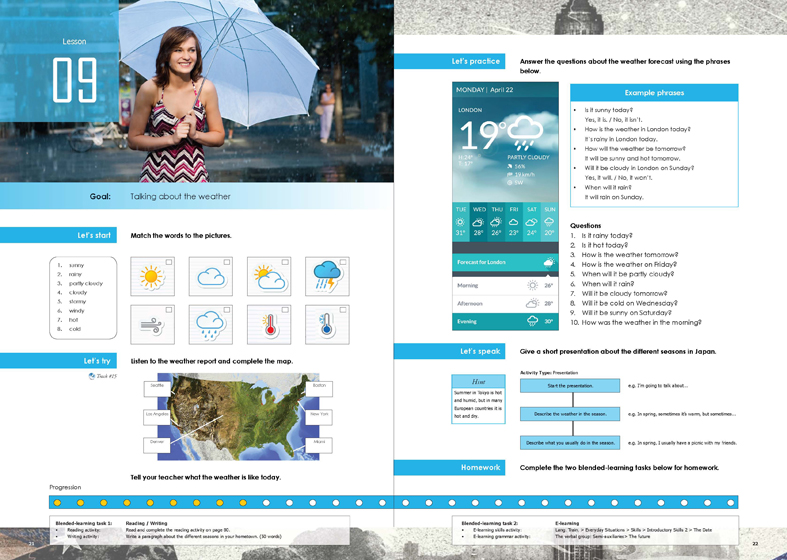
Manuals > General English > Rosetta Stone Advantage > Beginner - Book 1 > Lesson 9
< Previous Lesson | Next Lesson >

By the end of the lesson, the student should be able to talk about the weather.
Communication strategies:
The student should be able to able to talk about the weather by following the 2 steps below:
1) state what the weather is like today
2) state what the weather is like on a particular day in the future
e.g. It’s sunny today, but I think it will rain tomorrow.
Words and rules:
The student should be able to use the future tense. e.g. I will rain tomorrow.
The student should be able to use prepositions of time. e.g. It's going to rain on Tuesday.
The student should be able to use prepositions of place. e.g. It's going to rain in Shinjuku.
The student should be able to use "IT" to refer to the weather. e.g. It's going to rain soon.
The student should know some weather related vocabulary e.g. It's cloudy.
Appropriateness:
Non-verbal behaviour: You can "shrug" if you don't know the answer to question. e.g Is it going to rain tomorrow?
Register: When reading a weather forecast a polite register is usually used.
Social rules: Talking about the weather is a popular way to start a conversation.
Track #15
Hello, here is the national weather. Today, it will be sunny in New York and cloudy in Boston. In Miami, it will be stormy. In Denver, it will be snowy. In Seattle, it will be rainy and in Los Angeles, it will be hot.
Because the lesson touches on the topic of weather, you are welcome to introduce some of the following vocabulary if you like.
1) a cloud (n)
2) a storm (n)
3) humid (adj)
4) boiling (adj)
5) freezing (adj)
6) cool (adj)
7) warm (adj)
8) overcast (adj)
9) snow (v)
10) hail (v)
Option 1:
Difficulty ★
Type: Vocabulary introduction
Purpose: To teach the student nouns and verbs related to weather
Method: After you have introduced the basic adjectives related to weather e.g. “rainy”, “stormy”
see if the student can guess some related nouns and verbs. e.g. “to storm” / “a storm
Option 2:
Difficulty ★★
Type: Grammar introduction
Purpose: Expressing perception
Method: Teach the student the phrase “looks like” which can be used to express perception and
give an initial opinion on new information. This can be useful when you are looking at
weather information. e.g. It looks like it is going to rain tomorrow.
If you want to do some extra practice, you can bring up some different weather pictures and the student can make examples
e.g. a picture of a storm > It looks like it will rain soon.
Option 3:
Difficulty ★★★
Type: Realia presentation
Purpose: To give a weather forecast
Method: Have the student use their phone (or your phone, or the internet) to bring up a real
weather forecast for the week. Then have them pretend to be a weatherman and give a weather forecast.
Naruhodo point
“How is..” and “What is… like” mean the same thing. Lots of people make the mistake of saying “How is … like”
We can use “in” to talk about seasons
e.g. In summer it’s hot.
Extra questions you might like to ask in the lesson
- How is the weather?
- What is the weather like?
- Do you think it will rain tomorrow?
- What does the weather forecast look like?
Let’s start
Match the words to the pictures.
Top Line (L>R)
Sunny / cloudy / partly cloudy / stormy
Bottom Line (L>R)
Windy / rainy / hot / cold
Let’s try
Listen to the weather report and complete the map.
Track #15
Hello, here is the national weather. Today, it will be sunny in New York and cloudy in Boston. In Miami, it will be stormy. In Denver, it will be snowy. In Seattle, it will be rainy and in Los Angeles, it will be hot.
Seattle = rainy
Los Angeles = hot
Denver = snowy
Boston = cloudy
New York = sunny
Miami = stormy
Tell your teacher what the weather is like today.
It’s hot and rainy.
Let’s practice
Answer the questions about the weather forecast using the phrases below.
A) Is it rainy today?
B) Yes, it is.
A) Is it hot today?
B) No, it’s not.
A) How is the weather tomorrow?
B) It’s sunny.
A) How is the weather on Friday?
B) It’s cloudy and warm.
A) When will it be partly cloudy?
B) On Wednesday
A) When will it rain?
B) Thursday and Sunday
A) Will it be cloudy tomorrow?
B) No, it won’t.
A) Will it be cold on Wednesday?
B) No, it won’t.
A) Will it be sunny on Saturday?
B) No, it won’t.
A) How was the weather in the morning?
B) In the morning it was sunny.
Let’s speak
Give a short presentation about the different seasons in Japan.
I’m going to talk about the different seasons in Japan. Japan has four seasons, spring, summer, winter and fall. Spring is my favorite season. In spring, it’s warm, but it’s also very windy. In spring, I usually do hanami with my friends. In fall, Japan is usually warm or cool every day. There are lots of nice beers in fall. In summer, Japan is really hot and humid. I usually go to the beach in summer. In winter, it’s really cold in Japan. It sometimes snows where I live. In winter I like to go skiing.